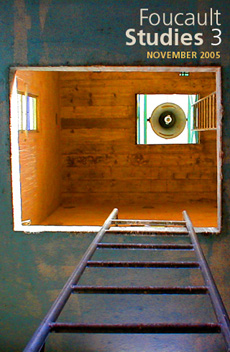In 'Descent' Proposal: Pathologies of Embodiment in Nietzsche, Kafka, and Foucault
DOI :
https://doi.org/10.22439/fs.v0i3.871Résumé
This paper advances the argument that Foucault's notion of 'bodily inscription' can be found in more rudimentary form in the Nietzschean notion of 'bodily descent'- the path qua pathology of 'going under' first outlined by Nietzsche in Thus Spoke Zarathustra. The argument is set within context of the ongoing debate in Foucault studies about whether a non-discursive dimension of the body can be posited or whether the body is always already and inevitably discursive. Following Judith Butler's assessment that there is in Foucault's work the presence of a body outside of signification, the present paper argues that Foucaultian bodily inscription is akin to Nietzschean bodily descent: both are predicated on and depend upon the occluded presence of an inherently 'indecent' or 'undisciplined' body, one that disrupts the discursive economy of subjectivization (assujettissement). Through the detailed reading of an exemplary tale by Franz Kafka ('In the Penal Colony'), we attempt to describe the structural axes or disciplinary matrix that descends and is imposed upon 'undisciplined' or 'indecent' bodies, revealing in so doing the 'indecent' body subject to this descent, the body 'crossed over' and 'crossed out' - 'double crossed' - by these axes, by this matrix. We suggest that it is at the crossroads or the crossing of these axes, precisely at the point where the indecent and untidy body is 'inscribed' and 'disciplined', that Foucault, like Nietzsche, locates a point that points beyond the structure, beyond axial and axiomatic binaries, to a body of inherent possibilities, affective virtualities, and spirited resistance.Téléchargements
Publié-e
2005-11-01
Comment citer
Mellamphy, D., & Mellamphy, N. B. (2005). In ’Descent’ Proposal: Pathologies of Embodiment in Nietzsche, Kafka, and Foucault. Foucault Studies, (3), 27–48. https://doi.org/10.22439/fs.v0i3.871
Numéro
Rubrique
Articles
Licence
Authors retain copyright to their work, but assign the right of the first publication to Foucault Studies. The work is subject to a CC BY-NC-ND 4.0 license, but despite these restrictions, authors can take for granted that Foucault Studies will permit articles published in Foucault Studies to be translated or reprinted in another format such as a book providing a full reference is made to Foucault Studies as the original place of publication.



